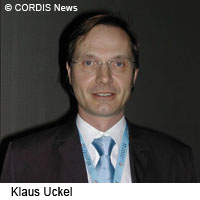The secret to Germany's FP6 success
Germany took the opportunity to look back at its impressive performance in the Sixth Framework Programme (FP6) as it held a national launch event for FP7 in Bonn on 15 and 16 January. Germany is ranked first among all participating countries for FP6. The latest available statistics from the European Commission show 7,449 German participations in 3,027 FP6 contracts, with a total EU contribution to German participants of around €2.3 billion. Overall, German researchers participated in 82% of FP6 projects in the thematic priorities and received nearly 19% of the overall FP6 budget. Proposals involving Germany also had a 24% success rate - significantly higher than the EU average of 18%. These figures come as no surprise when one considers how much the country invests in its national research base. According to preliminary figures from Eurostat for 2005, Germany is one of the highest investors in research in Europe, spending 2.51% of its GDP on research and development (R&D). In 2007, the German Government says it will increase its funding for research to €10 billion. However, the secret of Germany's success in FP6 does not lie in investment alone, but in the nature of the national research base, according to Klaus Uckel of the German Federal Ministry for Education and Research (BMBF). 'For us the focus has been on creating excellence,' he told CORDIS News, and by providing researchers with access to continued institutional and project support, whether it be at Länder (regional), federal or EU level. Germany's approach to funding differs somewhat from that of other Member States. Mr Uckel pointed to the UK as an example, where researchers cannot apply for national funding if resources are available at EU level. 'We didn't want to stress our scientists out by saying: 'you will only get money at national level which you cannot get at EU level',' explained Mr Uckel. He highlighted the potential dangers of cordoning off national funding in such a way. 'This could lead to an even higher oversubscription of the framework programme budget and result in weakening scientific excellence overall: because what will these scientists do if their EU proposal is not successful or if the EU money runs out?' he asked. The German 'open' funding mechanism is much more advantageous, believes Mr Uckel, since it helps to train researchers, giving them the experience they need in their field as well as acquainting them with the fine art of grant application. 'We always say that it is good training for young researchers to practice applying for grants first at national level and then based on this experience to go one step forward and apply for an EU grant,' he explained. Also key to Germany's successful participation in FP6 is ensuring that the national research agenda reflects what is happening at EU level, and vice versa. 'We are really trying to find coherence between the national and EU programmes. When we are planning the national thematic areas, we are paying close attention to the EU framework programme,' said Mr Uckel. 'That way those interested in participating in projects know at an early stage about our plans and what is on the agenda, both at national and EU level.' Aligning national and EU thematic areas would appear to have paid off. According to Mr Uckel, Germany achieved success rates above the EU average in nearly all thematic areas of FP6, with the exception of food quality and safety. Germany has also managed to bring onboard industry more successfully than many of the other participating countries. According to the latest statistics, there were as many participants in FP6 coming from German industry as there were from academia and public research institutes. 'The fact that industry is participating on an equal footing shows that the exchange or transfer of knowledge is very healthy in Germany,' said Mr Uckel. During the planning of FP7, German industry stakeholders called for a greater focus on the needs and interests of industry. 'But the data show that the framework programme has already been of interest to German industry. Industry itself didn't realise it was participating to this extent and is very happy with these indicators,' said Mr Uckel. He believes the figures will further encourage industry partners to participate. Helping the Education and Research Ministry to raise awareness of EU funding opportunities is the network of German national contact points (NCP), which covers both the thematic areas and horizontal areas of the framework programme. Mr Uckel believes that the network has been hugely instrumental in helping applicants to find their way through the complex application procedure, providing a lot of support on anything from legal and intellectual property rights (IPR) questions to responding to calls. The NCP network has also significantly contributed to discussions on the structuring and content of FP7. 'The ministry has taken a bottom-up approach to gain feedback on the thematic priorities and participants' experience of the framework programme. Thanks to this feedback, Germany was able to come up with suggestions to simplify the application procedures in FP7,' explained Mr Uckel. Looking towards FP7, Mr Uckel said that Germany, as one of the largest Member States, would be looking to help smaller countries in the Union to get involved in the framework programme. 'As a big industrial country, Germany has social responsibility towards the new Member States,' he said. Already in FP6, the ministry set up a Contact Point for the new Member States and accession countries and those researchers and institutes in Germany that are interested in working with partners from the new Member States and accession countries. As for Germany's own involvement, Mr Uckel says he is confident that his country will maintain its high performance, winning more project contracts. Judging by the number of researchers packing into the workshops at the FP7 launch event, Germany looks set for another successful framework programme.
Countries
Germany

